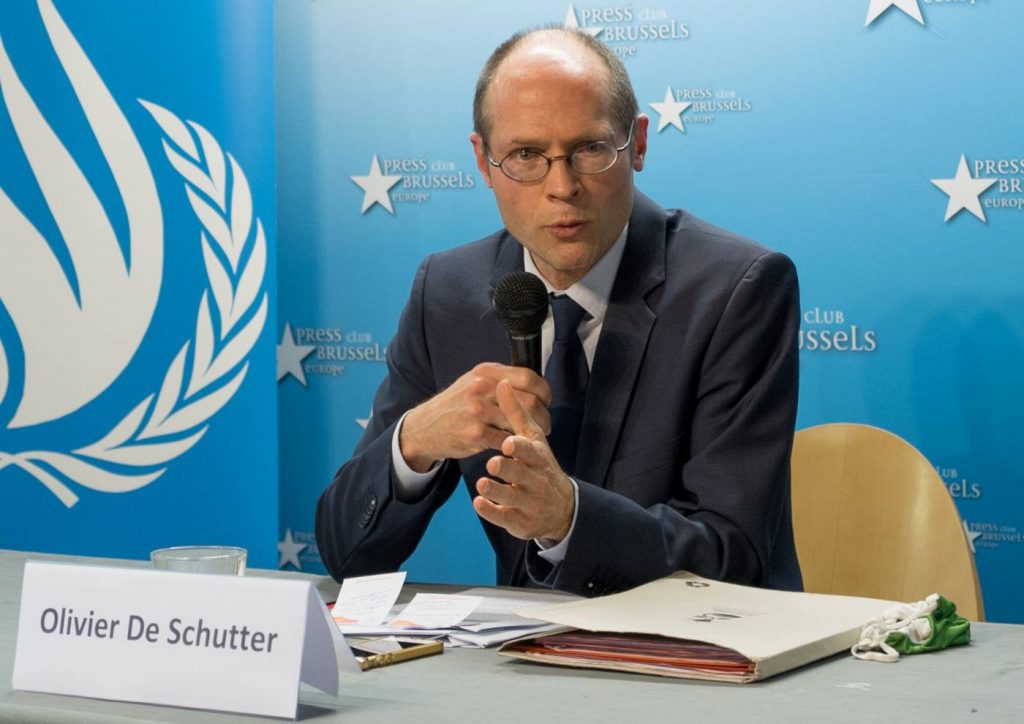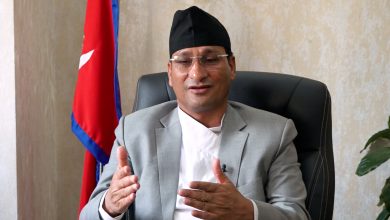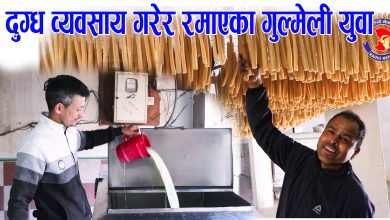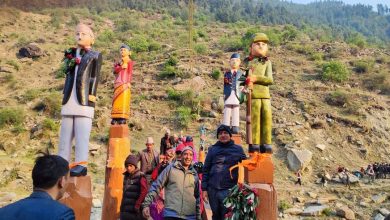An exclusive interview with renowned international expert on social and economic rights, globalization, and human rights Mr De Schutter

Kathmandu: United Nations since its establishment in 1945 has been dedicated to the wellbeing of world people with a tremendous contribution to peace, justice, human rights, sustainable development, and poverty alleviation. UN, long ago recognized that poverty itself could be the cause to conflict backwardness and denial of human rights.
Realizing the fact that people living in extreme poverty can be deprived of human rights, they are not heard by policymakers and often be neglected and overlooked by the state, United Nations in 1998 for the first time acknowledged extreme poverty as the obstacle to human development and continually working on it. Then after it began to assess the condition of extreme poverty and human rights situation of countries through the observation by the special rapporteur, as part of this Olivier De Schutter, UN special rapporteur on extreme poverty and human rights is now at Kathmandu to assess or to inquire the situation of Nepal on extreme poverty and human rights.
Mr De Schutter, a Belgian national is a renowned international expert on social and economic rights, economic globalization, and human rights. Also, the professor of law teaches human rights in many prestigious universities around the globe. To learn further about his visit to Nepal and his insights on extreme poverty and human rights. Let’s have a talk to him,
Mr De Schutter, Welcome to Radio Nepal Interview
Thank you! Good afternoon.
First of all, let me ask about your visit as a United Nation’s special rapporteur on extreme poverty and human rights. What mandate have you been assigned in this visit?
Well, I am an independent expert appointed by the human rights council, an inter-governmental body that meets in Geneva in order to be what they call the eyes and ears of the international community. The role of the Special Rapporteur is to visit countries, understand their situation and report back to the United Nations as to how the situation is developing. And I’m very grateful that the government of Nepal agreed to cooperate with the UN system so that it invited me to do this mission and then to report back to the human rights council.
So, you’ll obviously know the real situation of Nepal once you visit the different parts of the country and talk to the community members, civil society leaders, and other stakeholders, but you might have some prior calculations about the situation.
Indeed, a number of interesting questions emerged from, uh, the examination of the country. And I would be particularly interested in listening to communities and also to, of course, the officials about what is being done in the country concerning various types of discrimination that may result in people being left out from certain schemes, for example, the Dalit some 3.6 million, 13% of the population that have not been fully supported yet, despite the 2011 Caste Based Discrimination and Untouchability Act, I will be very interested also in examining the situation of the Adivasi, the Tharus in particular for which many efforts are being done, I will study the reservations policy introduced in the Civil Service Act, in 2007. And then I will discuss in great detail, all the issues raised by the extension of social protection in the country, the country that has made significant progress in recent years, but some blind spots still may remain in its policies.
So, there is multidimensional poverty. It’s not a new term, but it’s a little bit wide term when we’re talking about poverty. So you are also talking about the inclusion of all communities Dalits or indigenous people or varieties of, say different divisions, that should be mainstreaming for the overall prosperity of the country, and let’s say if we talk about labour market then we also should talk about unorganized labours or informal labour as well. Did you mean such? Can you make it more clear?
Indeed. I think the country is on a very promising track. It has graduated from being a least developed country and many indicators have been improving over the years. However, there are certain groups of the population that may need, greater attention. And, it is on those groups that my visit will focus. amongst them they are indeed, as you mentioned, the informal workers, some 81% of workers in Nepal. Some 6 million people are informal workers and they largely remain outside the country’s social protection system. There also are a number of people who do not have access to social protection because they do not have the identity certificates or sometimes the birth certificates that are needed to register for certain programs. So as you know, the United Nations has proclaimed the sustainable development goals in 2015, the very same year that Nepal adopted its constitution and one promise of the sustainable development goals and the 2030 agenda for sustainable development is that no one should be left behind. In other terms, we should pay attention to those groups that do not benefit from general progress within society that may be forgotten, despite overall improvement benefiting the rest of the population.
you just mentioned that Nepal is graduating, from the list of least developed countries to developing countries. There is also a transition period of five years for this to happen. If your visitor finds the situation is not so good (favourable), what will happen? Does that have some (negative)impact on our graduation there?
No, that will not have that kind of impact. My role is really to identify some issues that may have to be paid greater attention to. I present, at the end of the visit, with a sort of picture of the country. I present the government with a mirror, forcing in fact, people in Nepal, including, in particular, the government to see certain issues that may otherwise be ignored you know, respect for human rights starts with agreeing to look at them, in an impartial and objective manner not blinded by ideological lenses. And, my role is really to present the government with that objective picture. And then the hope is that the government can improve its policies, where certain aspects, may have been, incorrectly designed and certain groups may not be benefiting entirely from certain schemes that have been put in place that benefit others. And so that will be my role during this, two weeks long visit.
So our national planning commission has recently carried out a study on the poverty situation of the country after this pandemic and found that additional 1.6 million people have been added to the list of poor in such situation you also might not expect much improvement in the situation. What do you think?
Yes, indeed. And the national planning commission has a very important role in, Nepal in looking at this broad picture and drawing attention to the government, to these indicators. Nepal is a country that is making significant progress overall, but it is true that the COVID 19 pandemic has been a significant challenge just like a few years ago, the earthquake that happened in 2015 was a significant challenge. And I think now we have to identify social programs and the strengthening of social protection as a way to build resilience in the face of future crises, in my role as special rapporteur and extreme poverty and rights, I have, for example, proposed to the United Nations, that they adopt a new global fund for social protection that would precisely have as a role to intervene in terms of crisis providing additional support to countries facing certain challenges, such as those following an earthquake or following, the outbreak of a pandemic. And that is the kind of tool I think that I can present, I can propose to the UN and which I very much hope and in the future help countries such as Nepal in a crisis situation.
When you’re talking about social protection, the Nepal government has recently introduced a plan that distributes cash, RS 10,000 to every poor household who lost employment and livelihoods due to Covid 19 pandemic. What do you think, is it also some form of social protection or how does it help the poor?
Indeed, this is the kind of, a policy I will be looking at in great detail. And of course, the question, that I have is who actually, does benefit, how are these households identified that benefit is the targeting too narrow so that some people in poverty are left out or do not qualify for the program because for example of documentation problems is the problem is the program, sufficiently, protective of those households, is it sufficiently, well defined so that all people are informed about the rights may people complain if they are unjustified excluded from the program, when others may benefit from it. So these are some questions that, I will ask. you see social protection should not be seen as charity based as a sort of, a commitment the government makes, on a purely ad hoc basis, on arbitrary grounds it should be seen as a right. Individuals should be allowed to claim if they qualify under the conditions set forth in the legislation. And that is extremely important for people to claim their rights, that they feel that they have an entitlement to certain benefits, rather than this be charity based and, and resulting from the Goodwill of the government.
As the United Nations special rapporteur on extreme poverty and human rights. You are more focused on poverty, but there are human rights as well in your mandate. How are these two terms poverty and human rights are intertwined? What are you going to do in human rights in the next couple of days when you are here?
Indeed, my role is really to examine how the country is dealing with poverty, how it is trying to, bridge the gaps between different social groups that may be, very differently placed on the social-economic ladder and to do so in a right-based approach. So, I look at the fight against poverty based on the idea that if all people can enjoy the right to food, health housing, to education, then poverty can be eradicated. So my role is really to, identify which human rights are at risk as a result of, their remaining pockets of poverty in the country and certain groups being left behind.
Mr De Schutter, you are one of the very well known experts on poverty internationally, globally. Yo also worked for many countries, European countries, developing countries or less developed countries as well. So what did you find? Did you find the differences between the pattern and the trends of poverty between European countries and developing countries like Nepal?
Well, it’s interesting. Look, this is not a beauty contest between countries in which we compare different countries performances against one another. Each country has its own challenges and some have much, you know, favourable conditions when, others, struggle with the circumstances that they face. For example, the fact that Nepal is a landlocked country with the history, of, you know, civil war in the 1996 to 2006 period, that kind of factor is, of course, posing a particular challenge to the country in its fight against poverty. So I’m not there to compare countries against one another, all countries have poverty to face. Although the faces of poverty may look different from country to country. It is very striking that people in poverty, whether they are in Norway, in Canada, or in Nepal or Botswana, they speak about poverty in very much the same terms. They speak not only about lack of income, but they speak about lack of respect. They speak about disempowerment. They speak about institutional violence and abuse by social workers. They speak about discrimination. They face in their daily lives because they’re in poverty. And so it is very interesting to note that despite the fact that it’s very different to be poor in Nepal than to be poor in Uganda or Norway, the way people experience poverty is very similar.
In the context of Nepal, the government has already published a report that 18.7% population are already living in poverty. And because of this pandemic another 31.2% of the population who live close to poverty, are also vulnerable to fall on the extreme poverty. In total, there will be half of the population of Nepal is on the verge of extreme poverty. So if you have to list out some remedies categorically, what can you suggest? How could we escape from this vicious cycle of poverty?
Well, look, that is, premature for me to answer. I will be looking at, the program that is put in place and, which obstacles remain one particular interest of mine is how the federalization of the country is organized across seven provinces, 77 districts and 753 local government units, how does decentralization process is affecting the ability each, people in poverty, on one hand, it’s extremely interesting that local entities, local governments are given greater responsibilities in the fight against poverty. On the other hand, I note from certain, interviews I had and certain documents, I read that there is sometimes confusion as to, what are the respective roles of the federal government on the one hand. And on the other hand, of the province’s districts and, and local government officials, and one example of this, the role of the local entities in the deployment of the prime minister employment program that is meant to provide public employment for 100 days per year, at least to households, in need.
But that program is not reaching the targets, and one reason for this is that the local governments do not feel that the program is tailored to their needs. And so I’ll, I’ll also explore this issue, the impact of decentralization federalization on the deployment of social programs.
What the criticism is, in many developing and least developed countries the political party leaders are just distributing the budget to their political constituencies or to their election constituencies, in many cases that one after another government formed of political parties is benefiting only to their party cadres( instead of the needy population). So these are the common phenomena in developing countries and least developed countries. So how can we break such a tendency for that the development should be equally distributed to all? What do you feel?
Well, very clearly social protection should not depend on ethnicity, on family ties on costs. it should only be based on need, and it should be, therefore, impartially and objectively, deployed in order to reach the segments of the population that are most in need of public support through social programs. The best way to achieve this is to have a rights-based approach in how social protection is allocated, that means defining in legislation, who are the beneficiaries, what their entitlements are, how they can claim these allowances, these benefits that the law provides and which, recourse mechanisms they must have at their disposal in order to file complaints, indeed that is the only way to avoid favouritism and therefore miss-targeting of the support that the population obtains.
some people argue that social protection which distributes the cash and other benefits to the poor, marginalized people, is non-productive, and, that doesn’t have a very good impact in the long run. Do you agree?
This is incorrect and it’s based on a misunderstanding about what social protection is? Social protection is not, a sort of giveaway from the government to reduce poverty provisionally at the risk of endangering the balance of the country’s fiscal situation and endangering the equilibrium of its budget. Social protection is an investment, it’s an investment in inclusive growth, and it allows families to invest more in education, to invest more in training, it allows entrepreneurs to take risks. it allows the growth of the country to be stimulated by improving the purchasing power of the poor segments of the population. And, that is way also to avoid depression in times of crisis, by strengthening the economy and ensuring that it does not fall into a severe recession. So there are many arguments that explain that social protection is not a cost, it’s an investment for the future. It’s an investment for growth that is more inclusive and more sustainable.
Thank you, Mr De Schutter, for your valuable time in talking to Radio Nepal. Is there anything left, I should have asked?
Well, I look forward to, presenting the results of my visits on, on Thursday, the 9th of December. that will be the, um, the final day when I will present my main conclusions to the government and I look forward to, then I’m presenting a much more nuanced, balanced picture of the country, following my visit. Thank you very much. Goodbye. Goodbye.
This interview was conducted by Chief Editor of Radio Nepal Janardan Bista.
Click on the link below to listen to the original version of the interview.









प्रतिक्रिया राख्नुहोस्